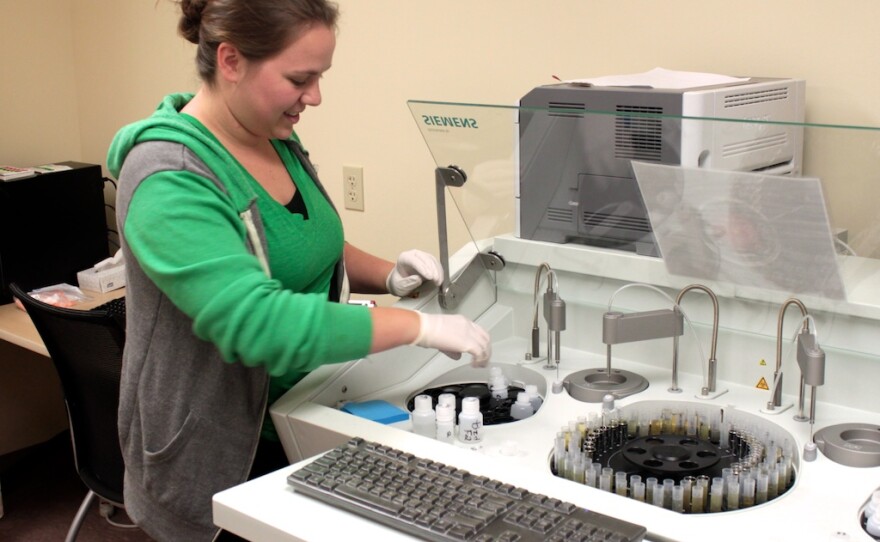A drug treatment facility opened in South Burlington last week despite a pending court case that could force it to shut down. HowardCenter’s new medically-assisted treatment facility – commonly known as a methadone clinic – opened on San Remo drive, close to South Burlington High School and Frederick H. Tuttle Middle School.
The 10,000 square-foot facility is HowardCenter’s third medically-assisted treatment location in Chittenden County. The non-profit already operates two similar programs: One on Fletcher Allen’s UHC campus near the University of Vermont, and one at a clinic formerly used by the Synergy Counseling Group in South Burlington, which the HowardCenter took over when that clinic suddenly closed in 2011.
Vermont has a half-dozen other medically-assisted treatment centers. Berlin, Bradford, Brattleboro, Newport and St. Johnsbury each have at least one clinic. State officials have expressed interest in starting a program in Rutland, but no clinics exist there to date.
Bob Bick, director of HowardCenter’s mental health and substance abuse services, said he hopes the new South Burlington facility will help shrink the organization’s waiting list for treatment. At its first two locations, HowardCenter already serves 630 patients with about 600 more on waiting lists.
The new center comes as HowardCenter works to battle what Bick calls a “sociological epidemic” in Vermont. When the UHC location opened about 10 years ago, Bick said, it had 40 patients, mostly dealing with heroin addictions.
Now, “there is literally no space at the current location,” Bick said.
Since then, Bick said, an increasing number of patients ended up with an addiction problem after starting with a legitimate prescription for high-powered, opioid painkillers such as Vicodin or OxyCotin.
While some community leaders say the clinic is a step in the right direction in Vermont’s efforts to reduce opioid addiction, its proximity to South Burlington’s schools led the School Board to appeal the clinic’s renovation permit (PDF).
In order to outfit the location for medically-assisted treatment, HowardCenter had to apply for a permit to complete an estimated $103,300 to renovate the space which was formerly used by a cardiologist.
South Burlington’s school board appealed the approval of HowardCenter’s interior renovation permit for the facility on the grounds that the location’s new use would generate more traffic. The city’s Planning and Zoning officials, the board alleged (PDF), did not do enough to examine the impacts of the new traffic.
While the school board’s stated reason for appeal is increased traffic, a paragraph tacked onto the end of their notice of appeal with South Burlington’s Development Review Board highlights another concern:
Additionally, due to the proposed location of the Methadone Clinic to the South Burlington High School and Frederick H. Tuttle Middle School campus, Appellant is concerned with the real potential for inappropriate interactions between patients and students, which may put the student at risk.
Elizabeth Fitzgerald, acting chair of the school board, said that “there is some concern about the increased crime rate that we've heard associated with other clinics and the increased traffic and the potential for the impaired driving as well."
As a result of the new clinic, Fitzgerald said the school district has moved its security personnel to an outbuilding on the northern corner of the school’s property, closer to the clinic.
Bick said he thinks the appeal is more about fear of the clinic’s patients than it is about traffic.
“If you look at the transcripts of the people who spoke at the early public hearings,” he said, “I think what you would come away with is a sense that it has much less to do with the traffic than the patients who would be receiving service here.”
The real worry for the community, Bick said, are the addicts that aren’t coming for treatment.
“The extent to which the community is and rightly should be concerned is about the opiate epidemic that exists out there for individuals who are not seeking treatment.”
South Burlington’s Development Review Board denied the school board’s appeal of the permit, so the board appealed to the state environmental court, which is currently reviewing the case. When that court denied the school board’s request to keep the clinic closed pending the outcome of the case, Judge Thomas Walsh’s decision (PDF) made it clear that the school board will be hard-pressed to win their appeal.
Walsh said the district “has not persuaded this Court that the alleged harms are likely to occur,” especially given HowardCenter’s reassurances that the school community would not be harmed by the clinic’s presence.
“In other words,” Walsh wrote, “the District has not demonstrated a sufficiently probable link between the interior renovation and operation of the proposed clinic and harm to its students, faculty, and staff.”
Though Walsh’s ruling was only an initial take on the case’s merits, the judge seemed convinced – especially by an affidavit filed by Chittenden County State’s Attorney TJ Donovan – that the clinic is good for the public.
“[HowardCenter] also offers persuasive evidence,” Walsh wrote, “particularly the affidavit of Thomas J. Donovan, that the public at large may be harmed if [HowardCenter] is delayed in treating patients currently on [their] waiting list.”
In an interview, Donovan said that “there is no perfect location” for the clinic, but HowardCenter’s other clinics had not caused significant harm to public safety and he saw no reason why the new location would be any different.
“On balance,” Donovan said, “the greater public safety threat, in my opinion, is not expanding the capacity for treatment.”







